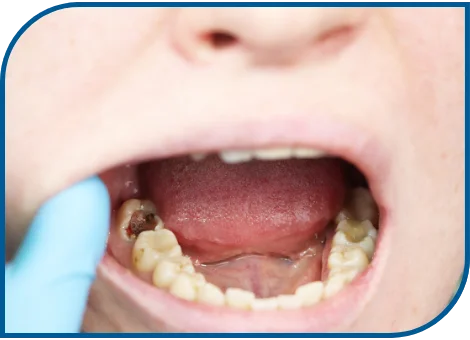Best Endodontists in Woodbridge, Vaughan
Our skilled team provides advanced endodontic treatments, including root canal therapy, to help save your teeth from extraction and relieve pain, allowing you to maintain a healthy, beautiful smile.



Why Choose Us?
At Sunny Day Dental, we understand that every patient has unique dental needs. Our personalized approach to endodontic treatment ensures the highest level of care for each individual. With experienced endodontists in Woodbridge, here’s why Sunny Day Dental stands out:
- Experienced and Compassionate Team:Our dental professionals are highly trained and committed to providing gentle, patient-focused care.
- State-of-the-Art Technology: We use the latest dental technology to ensure accurate diagnoses and effective treatments.
- Comprehensive Dental Services: From preventive care to restorative treatments, we cover all aspects of general dentistry.
- Family-Friendly Environment: We cater to patients of all ages, making our practice perfect for the entire family.
What is Endodontics?
Endodontics is a specialized branch of dentistry focused on diagnosing, treating, and preventing diseases and injuries affecting the tooth pulp (the innermost part containing nerves and blood vessels) and the tissues surrounding the tooth roots. If you need expert care, our skilled endodontist in Woodbridge performs procedures like root canal therapy to save teeth damaged by deep decay, trauma, or infection, helping you maintain your natural smile.
Why is Endodontic Treatment Necessary?
Endodontic treatment in Woodbridge is necessary when the pulp inside the tooth becomes inflamed or infected. This can occur due to:
- Deep Tooth Decay: Bacteria from a cavity can reach the pulp, causing an infection.
- Repeated Dental Procedures: Multiple dental procedures on a single tooth can irritate the pulp.
- Cracks or Chips: A cracked or chipped tooth can expose the pulp to bacteria, leading to infection.
- Injury: Even if a tooth injury doesn’t cause visible cracks or chips, it can still damage the pulp.
- Advanced Gum Disease: Severe gum disease can allow bacteria to reach the tooth roots, infecting the pulp.
If left untreated, an infected pulp can lead to severe pain, abscess formation, and even tooth loss. Seeking an endodontic dentist near me can help address these issues. Endodontic treatment eliminates infection, relieves pain, and preserves your natural tooth for long-term oral health.
Common Endodontic Services in Woodbride, Vaughan
At Sunny Day Dental, we offer several endodontic treatments in Woodbridge to address various dental issues:
Endodontic Retreatment
In some cases, a tooth that has undergone root canal therapy may become reinfected. At our endodontic clinic in Woodbridge, we offer endodontic retreatment, which involves reopening the tooth, removing the previous filling material, cleaning the canals, and placing new filling material. Retreatment is recommended when a tooth fails to heal properly or develops new issues after the initial procedure, ensuring your oral health is restored effectively.Apicoectomy (Root-End Surgery)
An apicoectomy is a surgical procedure performed when inflammation or infection persists after root canal therapy, or when retreatment is not an option. During an apicoectomy, the tip of the tooth root (apex) is removed, along with any infected tissue, and the root end is sealed with a biocompatible material. This procedure is often the last resort to save a tooth.Pulpotomy
Root canal therapy is the most common endodontic procedure and is performed to save a tooth with damaged or infected pulp. During a root canal, the infected pulp is removed, and the inside of the tooth is cleaned, disinfected, and sealed with a filling material. This procedure can alleviate pain, eliminate infection, and prevent the need for tooth extraction.Traumatic Dental Injury Treatment
Endodontic treatment is often required following dental injuries, such as a knocked-out or fractured tooth. Our endodontic team is experienced in treating a range of traumatic dental injuries, focusing on preserving the natural tooth whenever possible.
Trustindex verifies that the original source of the review is Google. Very pleasant staff and very nice Doctor. He is very professional and has human touch in his approach and made my fear reduce of going to dentist. Highly encourage people to go for any dental issuesTrustindex verifies that the original source of the review is Google. I didn't see a dentist for 25 years. Them I went to Sunny Day Dental and now I look forward to seeing my dentist. No fear...No pain... and I csn actually talk to my dentist. He is a normal human. Love this place. Recommend it to everyone.Trustindex verifies that the original source of the review is Google. Visted Sunnyday team for my wisdom tooth , very experienced team , receptionist were very knowledgeable related to insurance and benefits and explained everything clearly. Will be my go to dentistry moving forward. I would recommend it.Trustindex verifies that the original source of the review is Google. Dr Manoj is very thorough and honest, he never recommends any procedure that he doesn’t believe in. If you are looking for an honest dentist, this is the one.Trustindex verifies that the original source of the review is Google. Dr C is amazing. Treatment was pain free. I highly recommend this dental clinic.Trustindex verifies that the original source of the review is Google. Friendly and experienced dentist. It's my 3rd time visiting.Trustindex verifies that the original source of the review is Google. This dental office is amazing!!! The staff are great always polite. They always make my son feel welcomed and relaxed.
Frequently Asked Questions for Endodontists in Woodbridge
Q1. Why choose Sunny Day Dental for endodontics in Woodbridge?
At Sunny Day Dental, our experienced endodontist in Woodbridge combines advanced technology with personalized care to ensure your comfort and successful treatment. From root canals to retreatments, we’re here to save your smile with precision and expertise.
Q2. How long does a root canal take?
A root canal procedure typically takes one to two visits, each lasting about 60 to 90 minutes. The exact duration depends on the complexity of the case and the number of canals in the affected tooth.
Q3. When should I see an endodontist in Woodbridge?
You should visit an endodontist in Woodbridge if you experience severe tooth pain, prolonged sensitivity to hot or cold, swelling around the gums, or notice signs of infection like abscesses. Endodontists specialize in saving teeth through procedures like root canal therapy.
Q4. Will my tooth look different after a root canal?
After root canal therapy, a crown or filling is placed to restore the tooth’s appearance and function. With modern materials and techniques, these restorations are designed to match the color and shape of your natural teeth, so your tooth will look and function normally.
Q5. Can a tooth that has had a root canal still get cavities?
Yes, a tooth that has undergone root canal therapy can still develop cavities. It is important to maintain good oral hygiene, including brushing, flossing, and regular dental check-ups, to protect all of your teeth.
Q6. Is endodontic treatment painful?
Modern techniques and local anesthesia make endodontic treatments virtually pain-free. At Sunny Day Dental, our endodontist in Woodbridge prioritizes your comfort and ensures a smooth and stress-free experience.
